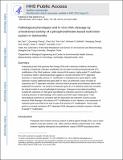Pathological phenotypes and in vivo DNA cleavage by unrestrained activity of a phosphorothioate-based restriction system in Salmonella
Author(s)
Cao, Bo; Cheng, Qiuxiang; Gu, Chen; Yao, Fen; DeMott, Michael S.; Zheng, Xiaoqing; Deng, Zixin; Dedon, Peter C.; You, Delin; ... Show more Show less
DownloadDedon_Pathological phenotypes.pdf (1.123Mb)
OPEN_ACCESS_POLICY
Open Access Policy
Creative Commons Attribution-Noncommercial-Share Alike
Terms of use
Metadata
Show full item recordAbstract
Prokaryotes protect their genomes from foreign DNA with a diversity of defence mechanisms, including a widespread restriction–modification (R–M) system involving phosphorothioate (PT) modification of the DNA backbone. Unlike classical R–M systems, highly partial PT modification of consensus motifs in bacterial genomes suggests an unusual mechanism of PT-dependent restriction. In Salmonella enterica, PT modification is mediated by four genes dptB–E, while restriction involves additional three genes dptF–H. Here, we performed a series of studies to characterize the PT-dependent restriction, and found that it presented several features distinct with traditional R–M systems. The presence of restriction genes in a PT-deficient mutant was not lethal, but instead resulted in several pathological phenotypes. Subsequent transcriptional profiling revealed the expression of > 600 genes was affected by restriction enzymes in cells lacking PT, including induction of bacteriophage, SOS response and DNA repair-related genes. These transcriptional responses are consistent with the observation that restriction enzymes caused extensive DNA cleavage in the absence of PT modifications in vivo. However, overexpression of restriction genes was lethal to the host in spite of the presence PT modifications. These results point to an unusual mechanism of PT-dependent DNA cleavage by restriction enzymes in the face of partial PT modification.
Date issued
2014-07Department
Massachusetts Institute of Technology. Center for Environmental Health Sciences; Massachusetts Institute of Technology. Department of Biological EngineeringJournal
Molecular Microbiology
Publisher
Wiley Blackwell
Citation
Cao, Bo, Qiuxiang Cheng, Chen Gu, Fen Yao, Michael S. DeMott, Xiaoqing Zheng, Zixin Deng, Peter C. Dedon, and Delin You. “ Pathological Phenotypes and in Vivo DNA Cleavage by Unrestrained Activity of a Phosphorothioate-Based Restriction System in S Almonella .” Molecular Microbiology 93, no. 4 (July 23, 2014): 776–785.
Version: Author's final manuscript
ISSN
0950382X
1365-2958